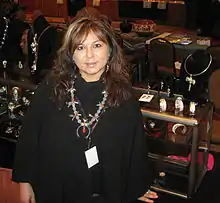Fond du Lac Band of Lake Superior Chippewa
Fond du Lac Band of Lake Superior Chippewa (or Wayekwaa-gichigamiing Gichigamiwininiwag in the Ojibwe language, meaning "Lake Superior Men at the far end of the Great Lake") is an Anishinaabe (Ojibwe) band located near Cloquet, Minnesota. Their land base is the Fond du Lac Indian Reservation (Ojibwe language: Nagaajiwanaang), located mainly in Carlton and Saint Louis Counties, Minnesota, 20 miles west of Duluth.
 Fond du Lac tribal flag | |
| Total population | |
|---|---|
| 4,044 (2007) | |
| Regions with significant populations | |
| Minnesota, United States | |
| Languages | |
| English, Ojibwe | |
| Religion | |
| Midewiwin, Christianity | |
| Related ethnic groups | |
| fellow Ojibwes |
The Fond du Lac Ojibwe are one of six bands who comprise the federally recognized Minnesota Chippewa Tribe, which was organized in 1934 with a new constitution under the Indian Reorganization Act. In July 2007, their enrolled members numbered 4,044.
History

The Fond du Lac Band of Lake Superior Chippewa originally inhabited the area along the lower courses of the Saint Louis River, where the present-day cities of Duluth, Minnesota and Superior, Wisconsin developed. The Wayekwaa-gichigamiing controlled the river access to both the Saint Louis and the Nemadji River rivers, major trade-routes during the decades of the fur trade with European traders. In the same area is Spirit Island of the "Sixth Stopping Place", one of the former seven Anishinaabe administrative centers.
The Fond du Lac Band's regional economic influence helped establish the American Fur Company's trading post in what now is the Fond du Lac neighborhood of Duluth. Two different Treaties of Fond du Lac were signed by the Fond du Lac Band.
Today

Fond du Lac Band of Lake Superior Chippewa is one of six members of the Minnesota Chippewa Tribe (MCT), from which it receives certain administrative services and support. The tribal government issues its own license plates. In the 2000 United States Census, the reservation recorded a population of 3,728 people and in July, 2007, MCT reported 4,044 people enrolled through Fond du Lac.
The largest community on the reservation is the city of Cloquet, of which only the sparsely populated western half of the city is on reservation land. That part has a population of 1,204 persons out of the city's total of 11,201. The only community completely on the reservation is Brookston, at the reservation's northern end.
The Band operates two casinos, the Fond du Luth Casino in Duluth and the Black Bear Casino Resort on the reservation. An agreement signed with the City of Duluth, in which property with-in city limits was given to the tribe to build the Fond du Luth Casino in return for profit sharing $6 million, approximately 20%, from slot machine gross revenue, was agreed upon in 1994. Profits are no longer shared with the city due to violation of the Indian Gaming Regulatory Act. This decision has been widely controversial, but each battle in court has seen the Band prevailing.
On August 31, 2018, the Band reached an agreement to let Enbridge build its Line 3 replacement pipeline across the Reservation.[2] The agreement extended Enbridge's rights of way on the Reservation by 10 years, to 2039.[2] The financial terms of the agreement were not disclosed.[2]
Government
The revised Constitution and By-Laws of the Minnesota Chippewa Tribe were approved by the Secretary of Interior on March 3, 1964. The governing body of the Fond du Lac Indian Reservation is the Reservation Business Committee, which is composed of a Chairman, Secretary-Treasurer, and three Representatives: one from District I (Cloquet), one from District II (Sawyer) and one from District III (Brookston). All are elected to four-year terms on a staggered basis, with the Chairman and Secretary-Treasurer also serving as members of the Executive Committee of the Minnesota Chippewa Tribe.
The current members of the Reservation Business Committee are:
- Chairman: Kevin Dupuis Sr.
- Secretary/Treasurer: Ferdinand Martineau Jr.
- District-I Representative: Wally Dupuis
- District-II Representative: Bruce Savage
- District-III Representative: Roger Smith
Notable members
- William Houle - Chairman of the Fond du Lac Band from 1974–1988
- Jim Northrup - Author, and "Fond du Lac Follies" columnist
- Thomas David Petite - Inventor
- Joe Pappio - Professional Football Player Chicago Cardinals, Oorang Indians (Jim Thorpe Coach) also played college football at Haskell Indian Nations University.
See also
References
- Roberts, Kathaleen. "Birch Bark Biting, One of the Rarest of Native American Art Forms, Will Be Featured at Showcase." Albuquerque Journal. 19 Nov 2007. Retrieved 22 Dec 2011.
- Hughlett, Mike (2018-08-31). "Fond du Lac agrees to let Enbridge's new pipeline cross its reservation". Star Tribune. Retrieved 2019-07-26.
External links
- Fond du Lac Band of Lake Superior Chippewa - Official tribal government website
- Bemaadizing: An Interdisciplinary Journal of Indigenous Life (An online journal)